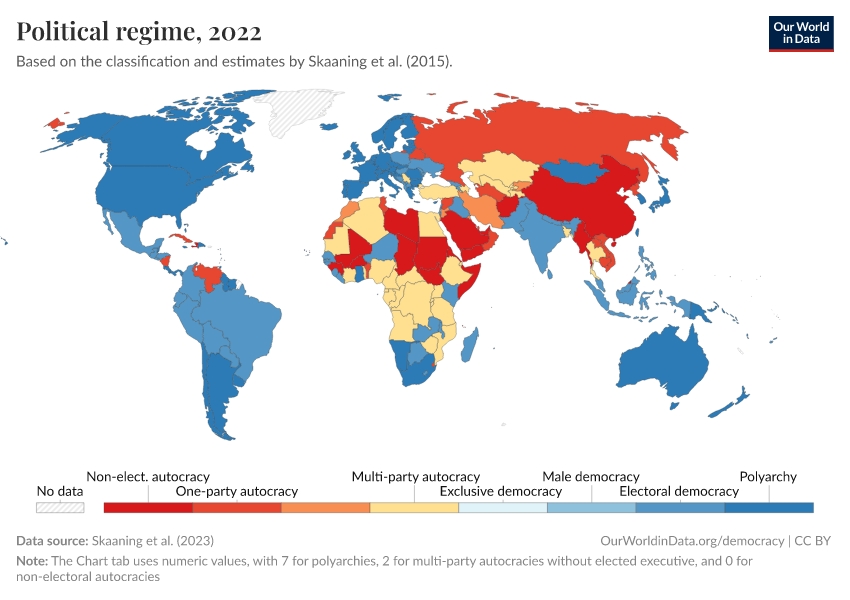Democracy

What you should know about this indicator
- In non-electoral autocracies, citizens do not have the right to elect the chief executive or the legislature.
- In one-party autocracies, some citizens have the right to choose the chief executive or the legislature, but only have one choice.
- Multiparty autocracies without an elected executive are otherwise one-party autocracies, but the chief executive of the government is not elected even if citizens have more than one choice in legislative elections.
- Multiparty autocracies are one-party autocracies in which citizens have more than one choice, though election outcome is certain.
- In exclusive democracies, citizens have the right to choose the chief executive and the legislature in multi-party, uncertain elections, but suffrage is restricted.
- Male democracies are exclusive democracies that have comprehensive suffrage for men.
- Electoral democracies are male democracies that also have comprehensive suffrage for women.
- Polyarchies are electoral democracies that also protect the freedoms of expression, assembly, and association.
Related research and writing
What you should know about this indicator
- In non-electoral autocracies, citizens do not have the right to elect the chief executive or the legislature.
- In one-party autocracies, some citizens have the right to choose the chief executive or the legislature, but only have one choice.
- Multiparty autocracies without an elected executive are otherwise one-party autocracies, but the chief executive of the government is not elected even if citizens have more than one choice in legislative elections.
- Multiparty autocracies are one-party autocracies in which citizens have more than one choice, though election outcome is certain.
- In exclusive democracies, citizens have the right to choose the chief executive and the legislature in multi-party, uncertain elections, but suffrage is restricted.
- Male democracies are exclusive democracies that have comprehensive suffrage for men.
- Electoral democracies are male democracies that also have comprehensive suffrage for women.
- Polyarchies are electoral democracies that also protect the freedoms of expression, assembly, and association.
Sources and processing
This data is based on the following sources
How we process data at Our World in Data
All data and visualizations on Our World in Data rely on data sourced from one or several original data providers. Preparing this original data involves several processing steps. Depending on the data, this can include standardizing country names and world region definitions, converting units, calculating derived indicators such as per capita measures, as well as adding or adapting metadata such as the name or the description given to an indicator.
At the link below you can find a detailed description of the structure of our data pipeline, including links to all the code used to prepare data across Our World in Data.
Notes on our processing step for this indicator
0: non-electoral autocracy 1: one-party autocracy 2: multi-party autocracy without elected executive 3: multi-party autocracy 4: exclusive democracy 5: male democracy 6: electoral democracy 7: full democracy (polyarchy)
Reuse this work
- All data produced by third-party providers and made available by Our World in Data are subject to the license terms from the original providers. Our work would not be possible without the data providers we rely on, so we ask you to always cite them appropriately (see below). This is crucial to allow data providers to continue doing their work, enhancing, maintaining and updating valuable data.
- All data, visualizations, and code produced by Our World in Data are completely open access under the Creative Commons BY license. You have the permission to use, distribute, and reproduce these in any medium, provided the source and authors are credited.
Citations
How to cite this page
To cite this page overall, including any descriptions, FAQs or explanations of the data authored by Our World in Data, please use the following citation:
“Data Page: Democracy”, part of the following publication: Bastian Herre, Lucas Rodés-Guirao, and Esteban Ortiz-Ospina (2013) - “Democracy”. Data adapted from Skaaning et al.. Retrieved from https://archive.ourworldindata.org/20260119-065148/grapher/political-regime-lexical.html [online resource] (archived on January 19, 2026).How to cite this data
In-line citationIf you have limited space (e.g. in data visualizations), you can use this abbreviated in-line citation:
Skaaning et al. (2025) – processed by Our World in DataFull citation
Skaaning et al. (2025) – processed by Our World in Data. “Democracy” [dataset]. Skaaning et al., “Lexical Index of Electoral Democracy (LIED) v6.8” [original data]. Retrieved February 28, 2026 from https://archive.ourworldindata.org/20260119-065148/grapher/political-regime-lexical.html (archived on January 19, 2026).